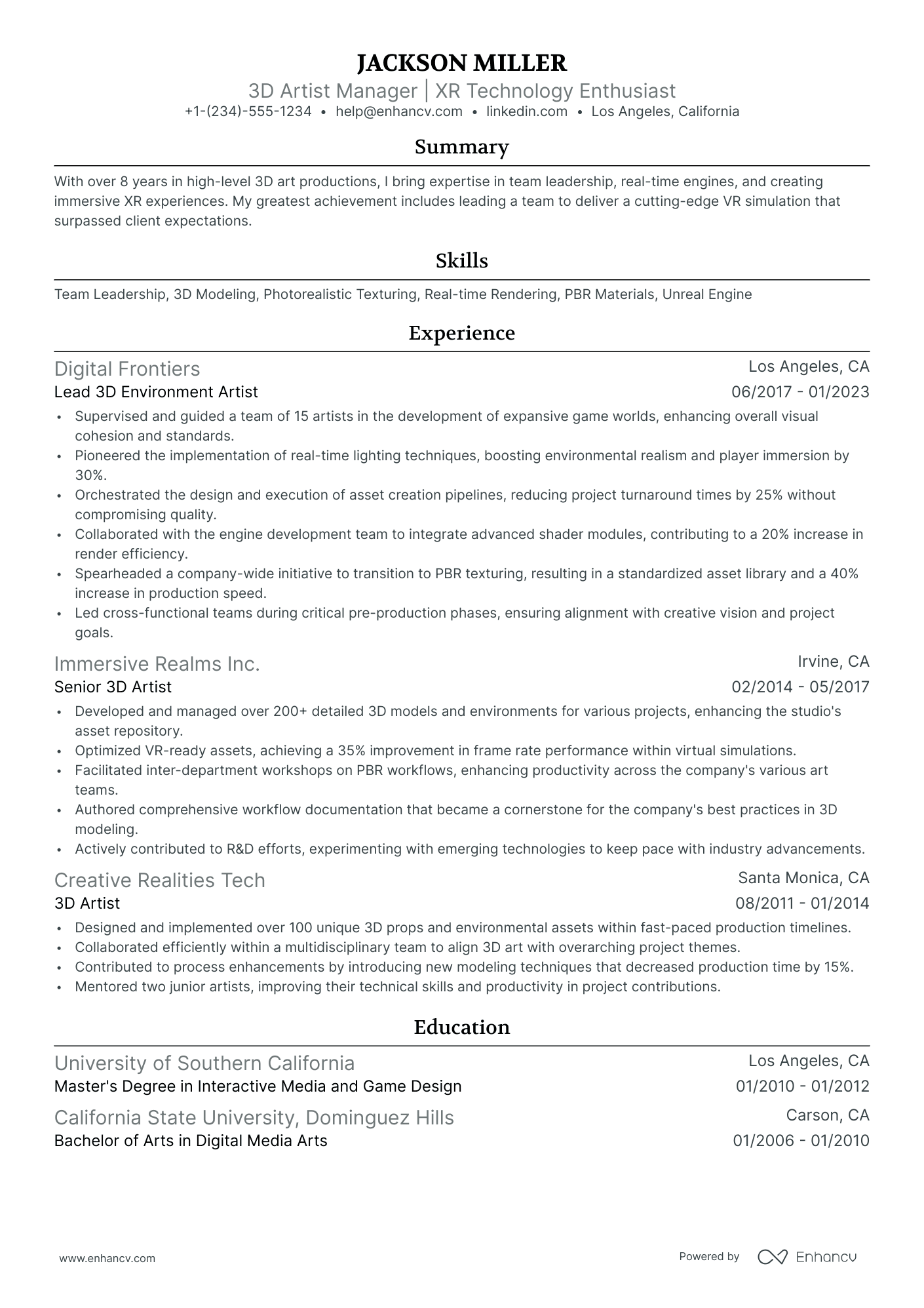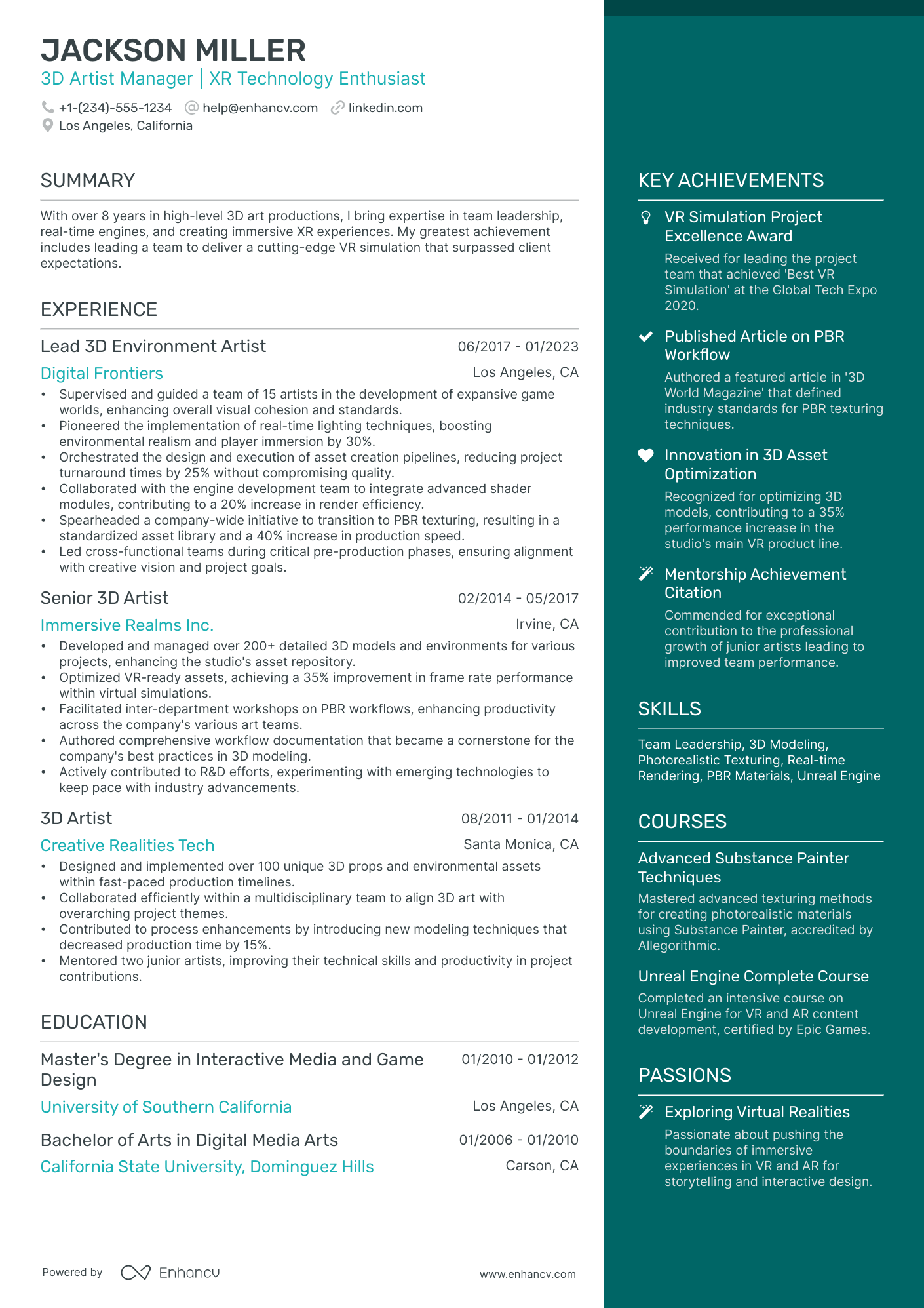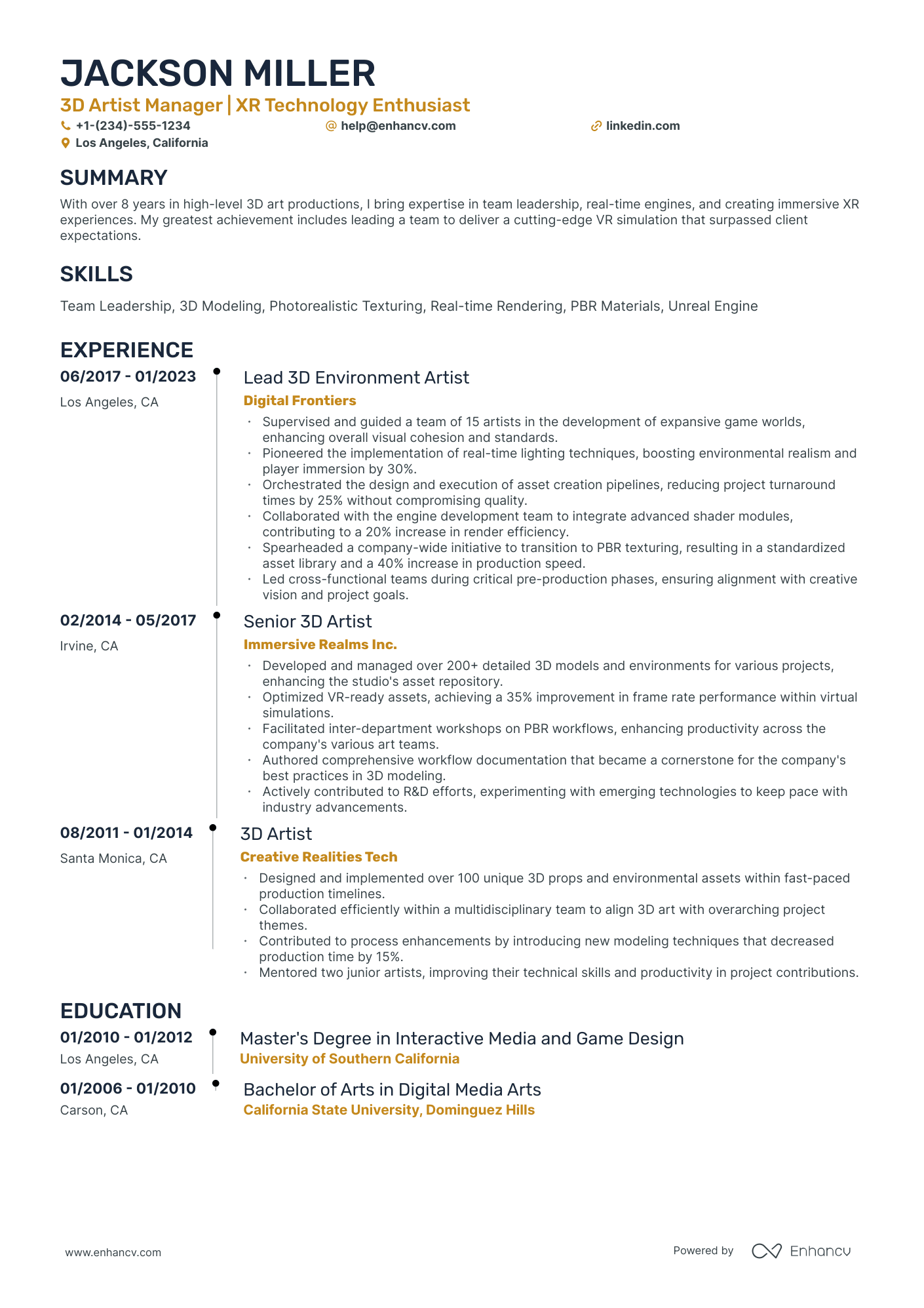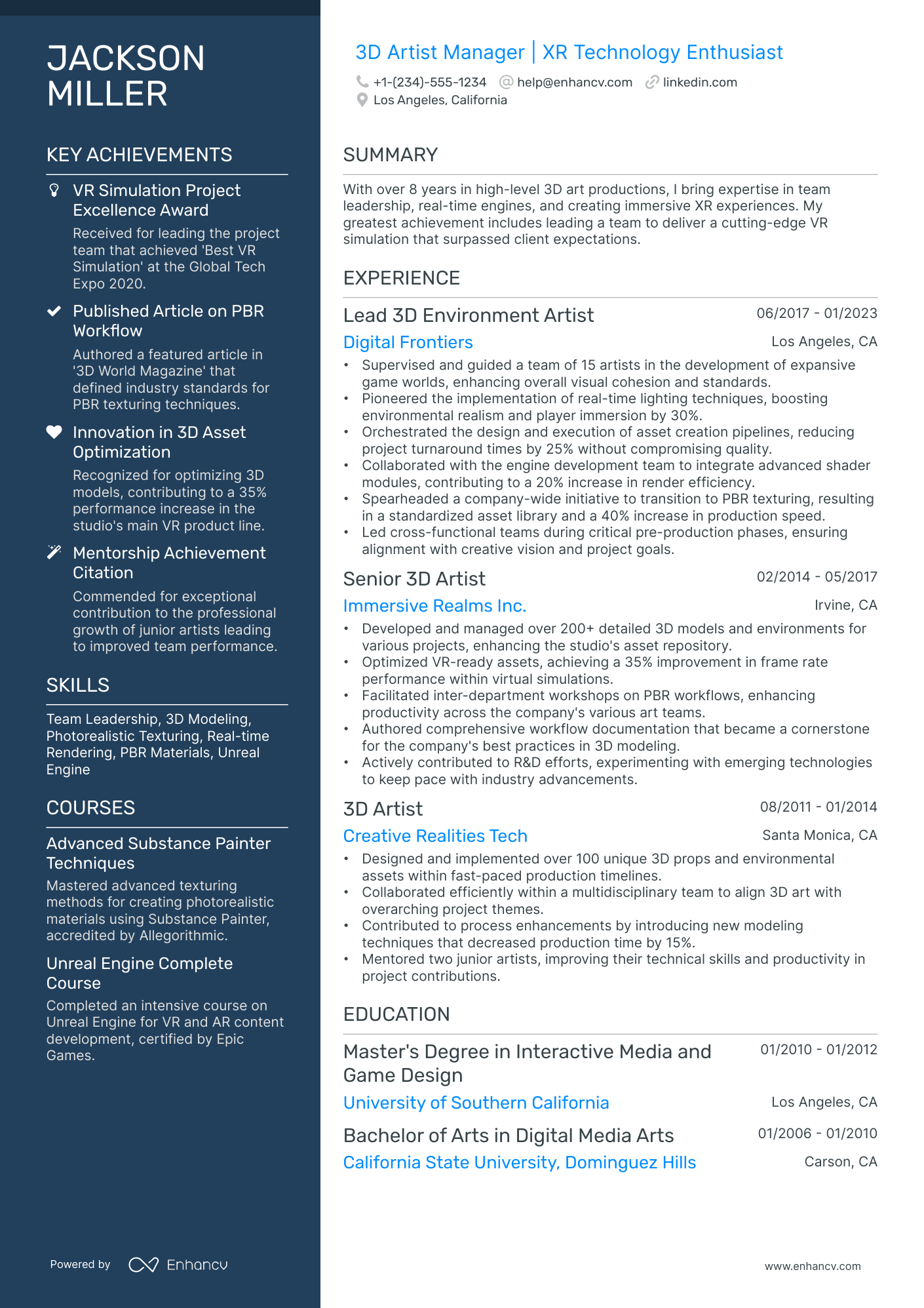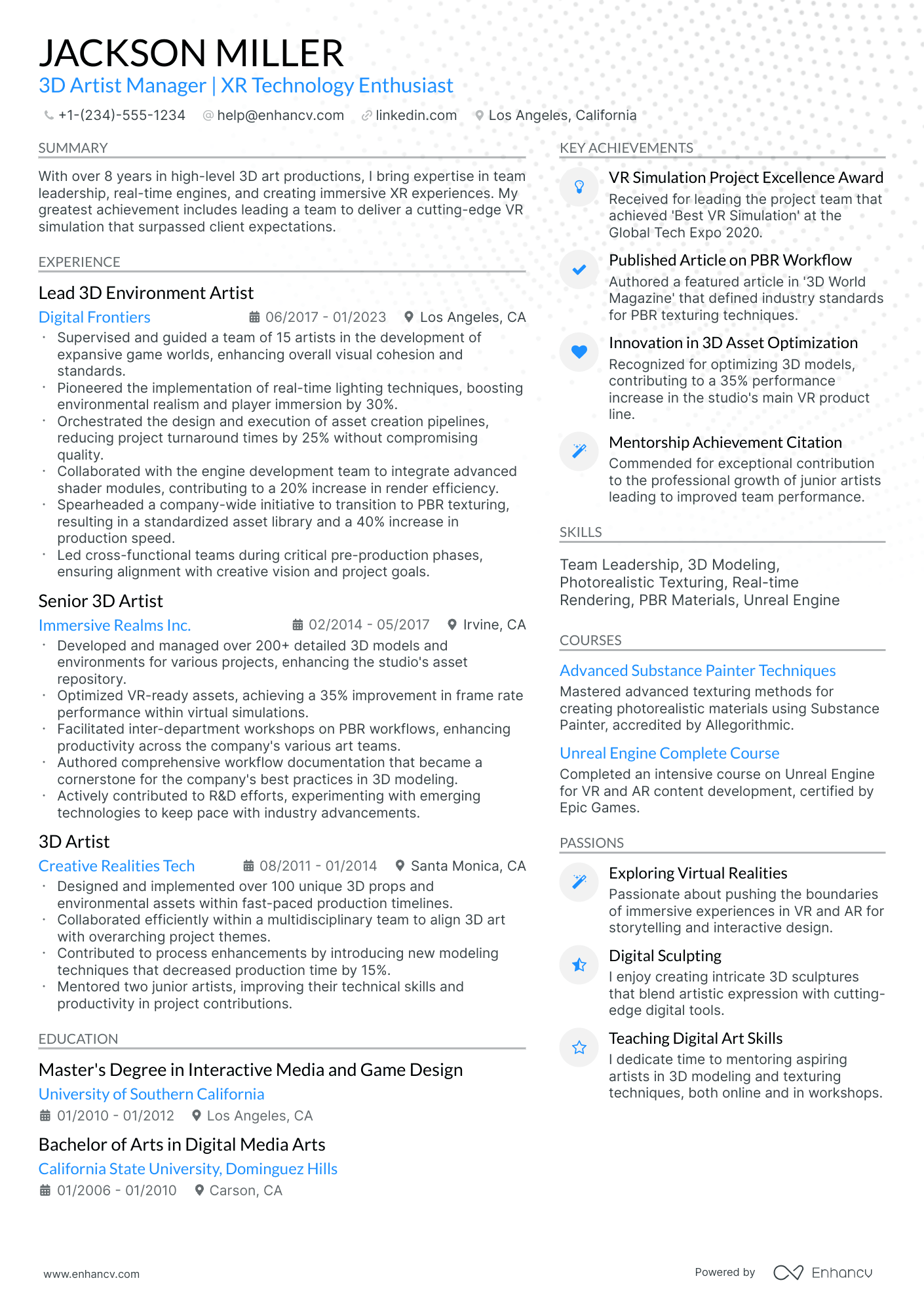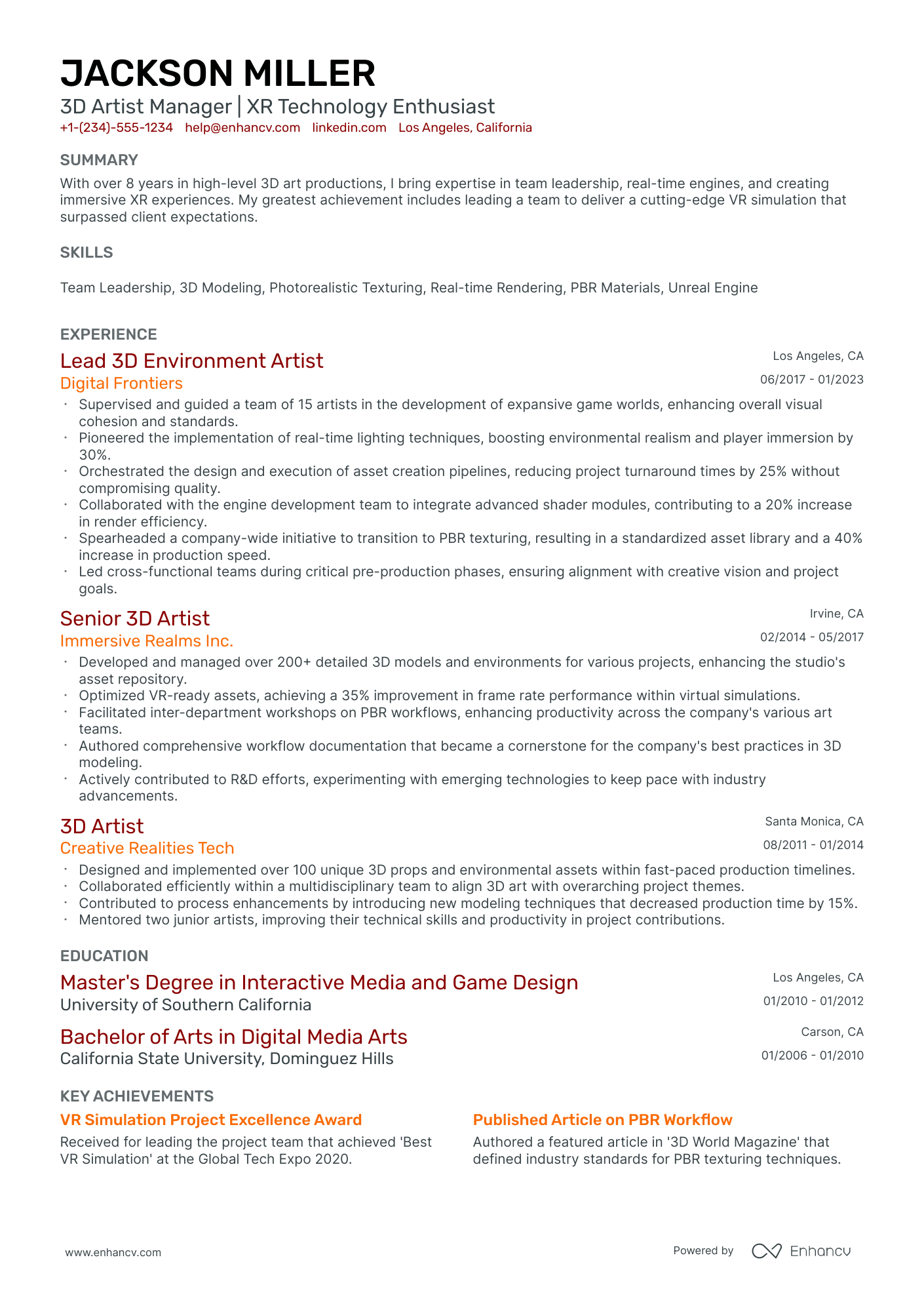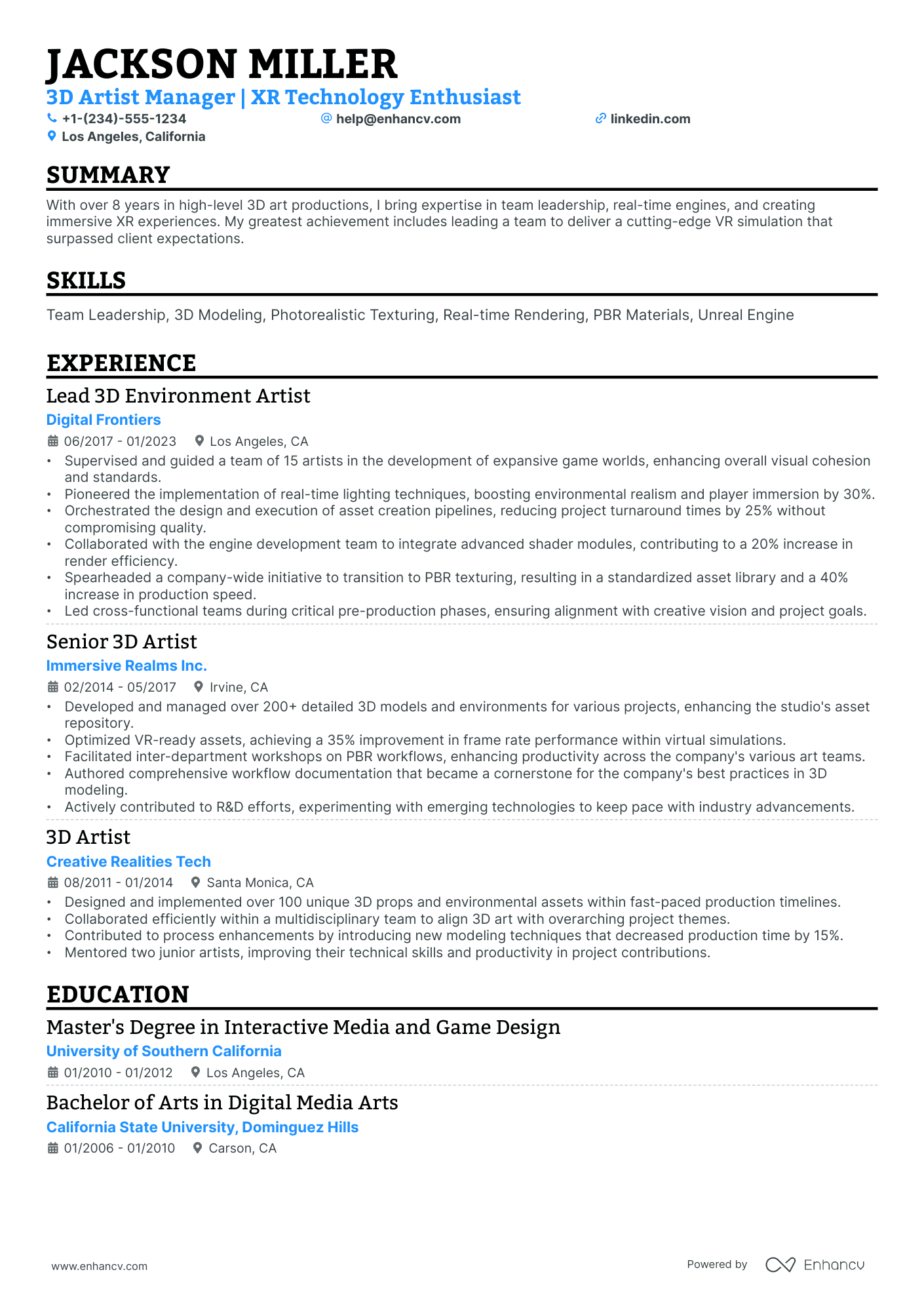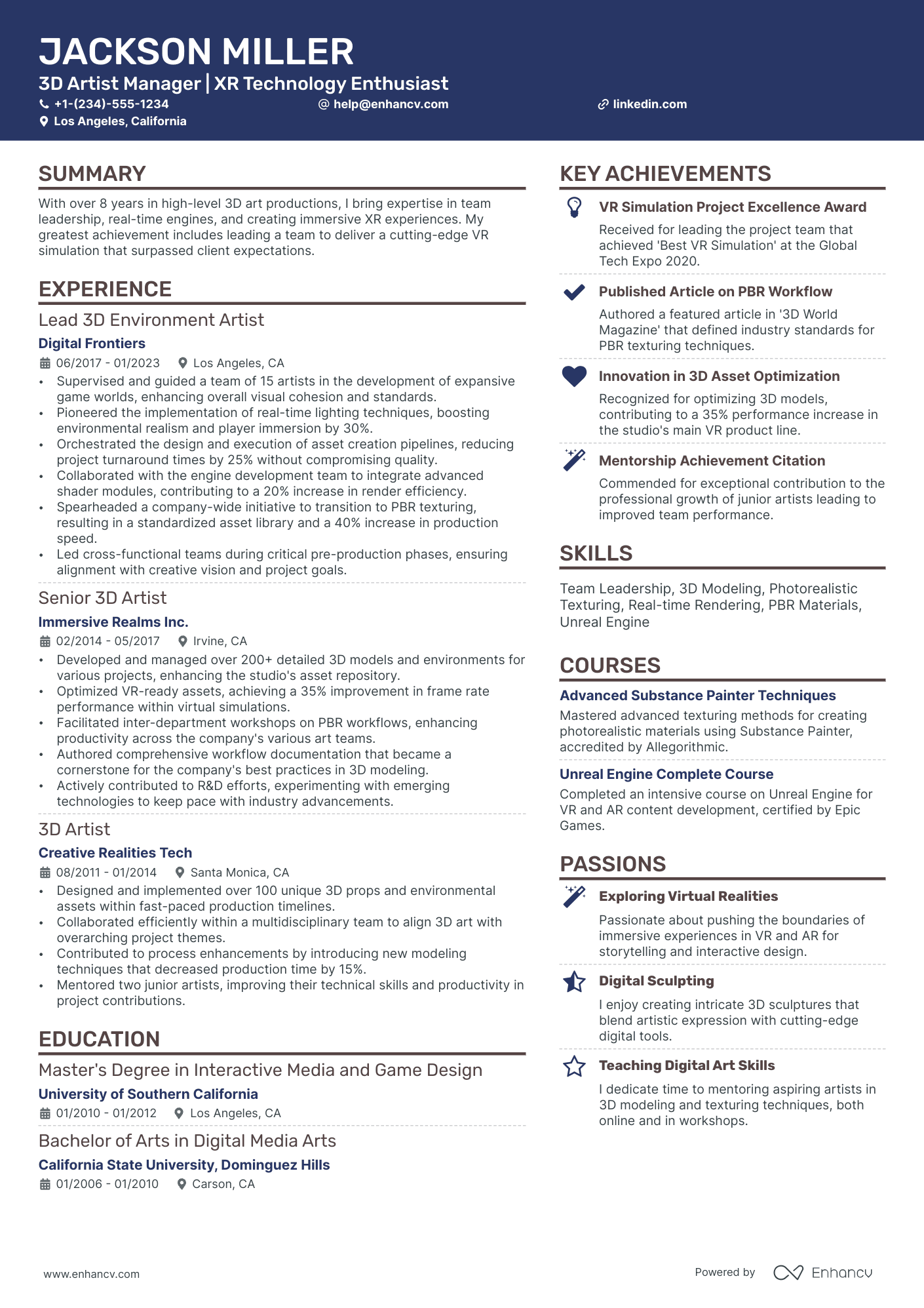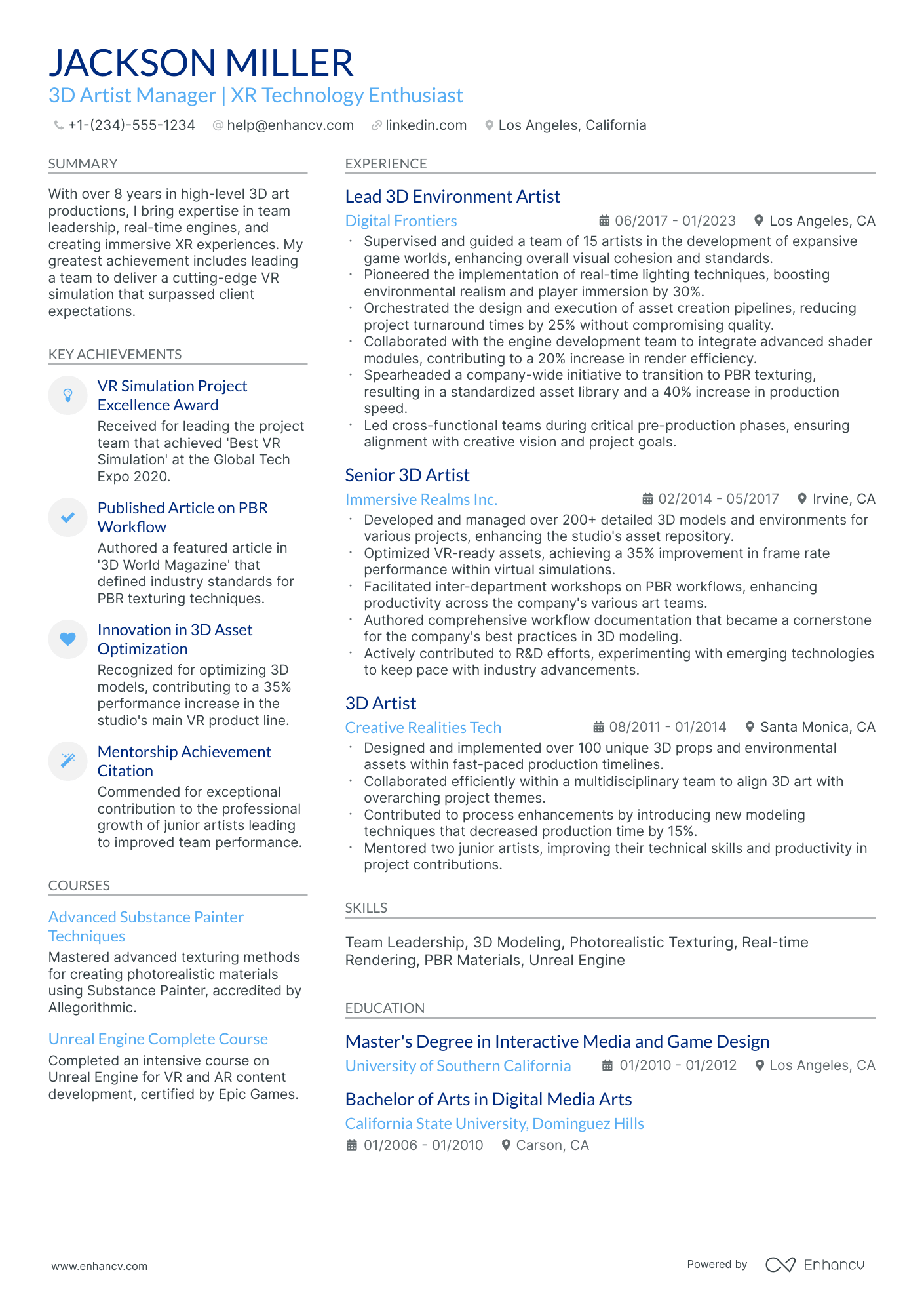Most artist manager resume submissions fail because they read like task logs and bury measurable impact under long project lists. In today's hiring process, an ATS filters fast, recruiters scan in seconds, and competition is intense.
A strong resume shows what you delivered and why it mattered. Knowing how to make your resume stand out is essential in this field. Highlight revenue growth, tour gross, deal terms improved, streaming lift, brand partnership value, budget size managed, sell-through rates, and fanbase growth across platforms. Show scale, timelines, and outcomes.
Key takeaways
- Quantify achievements like revenue growth, tour profit, and streaming gains in every bullet.
- Use reverse-chronological format if you have direct artist management experience.
- Tailor experience bullets to mirror each job posting's specific language and priorities.
- Place skills above experience when you're junior or switching into artist management.
- Anchor every listed skill to a measurable outcome or specific project.
- Use Enhancv's tools to refine bullet points and align your resume with role requirements.
- Pair your resume with a cover letter when targeting a specific roster or competitive role.
How to format a artist manager resume
Recruiters evaluating artist manager resumes look for a clear track record of client roster growth, revenue generation, deal negotiation, and strategic career development for talent. The right resume format ensures these signals are immediately visible rather than buried under generic skills lists or disjointed sections.
I have significant experience in this role—which format should I use?
Use a reverse-chronological format to showcase your deepening responsibility across artist rosters, deal complexity, and revenue milestones. Do:
- Lead with your most recent management role, emphasizing roster size, genre scope, and decision-making authority over touring, licensing, and brand partnerships.
- Highlight industry-specific tools and domains such as contract negotiation, royalty management platforms, booking systems, and label/distributor relations.
- Quantify business impact through revenue figures, audience growth metrics, and deal values tied directly to your strategic decisions.
I'm junior or switching into this role—what format works best?
A hybrid format works best, letting you lead with relevant skills while still providing a chronological work history that shows momentum. Do:
- Place a skills section near the top featuring core competencies like talent scouting, social media strategy, event coordination, and contract basics.
- Include project-based experience such as managing an independent artist's release campaign, coordinating showcases, or running promotional events—even outside traditional employment.
- Connect every action to a measurable or observable result so recruiters can assess your potential impact.
Why not use a functional resume?
A functional format strips away the timeline recruiters need to evaluate how your skills developed in real artist management contexts, making it harder to assess your readiness for the role. A functional resume might make sense if you're pivoting from a related field like music marketing, booking, or A&R and have no direct management titles—but only if you anchor every listed skill to a specific project, collaboration, or measurable outcome. Avoid a functional format entirely if you have any relevant work history, as most applicant tracking systems and hiring managers default to scanning for chronological role progression.
Once you've established a clean, readable format, the next step is deciding which sections to include so each one reinforces your qualifications as an artist manager.
What sections should go on a artist manager resume
Recruiters expect a clear snapshot of the artists you've managed, the revenue and growth you drove, and the partnerships you secured. Understanding what to put on a resume helps you prioritize the right information for this role.
Use this structure for maximum clarity:
- Header
- Summary
- Experience
- Skills
- Projects
- Education
- Certifications
- Optional sections: Awards, Leadership, Languages
Strong experience bullets should emphasize measurable impact—revenue, audience growth, deal terms, tour outcomes, and the scope of artists, budgets, and stakeholders you managed.
Is your resume good enough?
Drop your resume here or choose a file. PDF & DOCX only. Max 2MB file size.
Once you’ve organized your resume with the right components in place, the next step is to write your artist manager resume experience section so it supports that structure with clear, role-specific detail.
How to write your artist manager resume experience
The experience section is where you prove you've delivered real results for artists, labels, and industry partners—not just managed calendars. Hiring managers looking for an artist manager prioritize demonstrated impact through negotiations closed, revenue grown, tours executed, and careers advanced over descriptive task lists of daily duties.
Each entry should include:
- Job title
- Company and location (or remote)
- Dates of employment (month and year)
Three to five concise bullet points showing what you owned, how you executed, and what outcomes you delivered:
- Ownership scope: the artists, rosters, revenue streams, brand partnerships, or creative projects you were directly accountable for building and sustaining.
- Execution approach: the industry tools, contract negotiation strategies, booking platforms, marketing channels, or relationship-building methods you used to advance artist careers and make strategic decisions.
- Value improved: changes to an artist's earning potential, audience reach, brand visibility, release performance, or career trajectory that resulted from your management.
- Collaboration context: how you coordinated with record labels, booking agents, publicists, legal teams, producers, and other stakeholders to align on an artist's creative and commercial goals.
- Impact delivered: outcomes expressed through career milestones reached, deal terms secured, audience growth achieved, or revenue generated—framed as results rather than routine activity.
Experience bullet formula
A artist manager experience example
✅ Right example - modern, quantified, specific.
Artist Manager
Indigo Meridian Management | Los Angeles, CA
2021–Present
Boutique artist management firm representing emerging and mid-career recording artists across pop and alternative with national touring and label partnerships.
- Negotiated and executed sixteen performance and brand partnership agreements using DocuSign and Airtable deal tracking, increasing annual gross revenue by 38% and improving average contract turnaround time from nine days to four.
- Built a release and campaign operating system in Asana integrated with Google Workspace and Slack, aligning label, public relations, and creative teams to deliver twelve releases with 95% on-time milestones and zero missed distributor deadlines.
- Directed tour routing and budget planning in Master Tour and Excel, reducing per-show costs by 12% and increasing net tour profit by $84K across a twenty-eight-date run through tighter settlements and vendor renegotiations.
- Launched a fan growth program using Shopify, Mailchimp, and Meta Ads Manager, lifting direct-to-fan revenue by 27% and growing email subscribers from 18K to 26K with segmented drops and automated flows.
- Produced weekly performance reporting in Chartmetric and Spotify for Artists, translating insights into pitching and content decisions with the artist, label team, and playlist partners, driving a 22% increase in monthly listeners over six months.
Now that you've seen how to structure your experience entries, let's focus on customizing them to match the specific artist manager role you're targeting.
How to tailor your artist manager resume experience
Recruiters evaluate artist manager resumes through both human review and applicant tracking systems, scanning for alignment between your background and the role's specific needs. Tailoring your resume to the job description ensures your most relevant accomplishments stand out in both screening methods.
Ways to tailor your artist manager experience:
- Match touring platforms and booking software named in the posting.
- Mirror the job description's terminology for royalty collection processes.
- Reflect specific revenue or growth KPIs the employer prioritizes.
- Highlight experience in the music genres or entertainment sectors listed.
- Emphasize contract negotiation frameworks referenced in the role description.
- Include cross-functional collaboration with labels and publishing teams mentioned.
- Align your brand development strategies with their stated artist goals.
- Reference digital distribution channels or streaming analytics tools they specify.
Tailoring means aligning your real achievements with what the employer asks for, not forcing keywords where they don't naturally belong.
Resume tailoring examples for artist manager
| Job description excerpt | Untailored | Tailored |
|---|
Once you’ve aligned your experience with the role’s priorities, the next step is to quantify your artist manager achievements so employers can see the impact behind each responsibility.
How to quantify your artist manager achievements
Quantifying your achievements proves you drove outcomes, not just activity. For artist managers, track revenue, retention, campaign conversion, turnaround time, and risk reduction across tours, releases, partnerships, and budgets.
Quantifying examples for artist manager
| Metric | Example |
|---|---|
| Revenue growth | "Grew gross show revenue 28% in six months by renegotiating guarantees, tightening settlement reviews, and routing ten dates with a $2.4M total gross." |
| Fan conversion | "Increased email-to-ticket conversion from 2.1% to 3.4% using Mailchimp segmentation and A/B offers across four on-sale campaigns." |
| Retention | "Renewed three brand partnerships worth $180K by improving reporting cadence, adding quarterly recaps, and meeting all deliverables on time." |
| Cycle time | "Cut approval time for social and press assets from five days to two by implementing a Trello workflow and weekly stakeholder check-ins." |
| Risk reduction | "Reduced contract errors by 60% by standardizing rider and deal memo templates and running a pre-sign checklist for twenty-five agreements." |
Turn vague job duties into measurable, recruiter-ready resume bullets in seconds with Enhancv's Bullet Point Generator.
With strong bullet points in place, the next step is ensuring your artist manager resume highlights the right mix of hard and soft skills to back them up.
How to list your hard and soft skills on a artist manager resume
Your skills section shows you can grow revenue, protect the artist's brand, and execute releases and tours—recruiters and ATS scan this section for role keywords and fit, so aim for a balanced mix of hard skills and job-specific soft skills. artist manager roles require a blend of:
- Product strategy and discovery skills.
- Data, analytics, and experimentation skills.
- Delivery, execution, and go-to-market discipline.
- Soft skills.
Your skills section should be:
- Scannable (bullet-style grouping).
- Relevant to the job post.
- Backed by proof in experience bullets.
- Updated with current tools.
Place your skills section:
- Above experience if you're junior or switching careers.
- Below experience if you're mid/senior with strong achievements.
Hard skills
- Contract negotiation, deal memos
- Music licensing, rights management
- Royalty accounting, statement review
- PRO registration: ASCAP, BMI, SESAC
- DSP pitching: Spotify for Artists, Apple Music for Artists
- YouTube Studio, Content ID management
- Tour budgeting, settlement reconciliation
- Release planning, rollout calendars
- CRM and email: HubSpot, Mailchimp
- Social analytics: TikTok Analytics, Meta Business Suite
- Project management: Asana, Trello, Airtable
- Press and radio servicing workflows
Soft skills
- Align stakeholders on priorities
- Set clear expectations and deadlines
- Lead difficult negotiations calmly
- Communicate updates with context
- Make fast tradeoff decisions
- Protect the artist's boundaries
- Manage conflict between partners
- Hold teams accountable to deliverables
- Run efficient cross-functional meetings
- Anticipate risks and escalation paths
- Build long-term industry relationships
- Stay composed under tour pressure
How to show your artist manager skills in context
Skills shouldn't live only in a dedicated skills list. Explore resume skills examples to see how other professionals present their competencies effectively.
They should be demonstrated in:
- Your summary (high-level professional identity)
- Your experience (proof through outcomes)
Here's how that looks in practice.
Summary example
Artist manager with 12 years in indie and electronic music, skilled in tour routing, sync licensing, and brand partnership negotiation. Built roster revenue by 180% using Chartmetric analytics and cross-platform marketing strategies.
- Reflects senior-level experience clearly
- Names industry-specific tools and methods
- Quantifies revenue growth with a metric
- Signals relationship-driven leadership ability
Experience example
Senior Artist Manager
Bright Noise Management | Los Angeles, CA
June 2018–Present
- Grew combined roster streaming revenue by 145% over three years by leveraging Spotify for Artists and Chartmetric data to refine release strategies.
- Negotiated 22 brand partnership deals averaging $35K each, collaborating closely with legal counsel, publicists, and label A&R teams.
- Coordinated 14 national tours across 90+ venues, reducing per-show logistics costs by 18% through optimized routing and vendor consolidation.
- Every bullet includes measurable proof.
- Skills surface naturally through real outcomes.
Once you’ve anchored your management strengths in real examples, the next step is applying that approach to building an artist manager resume with no experience so your potential still reads clearly.
How do I write a artist manager resume with no experience
Even without full-time experience, you can demonstrate readiness through transferable projects and early wins. If you're building a resume without work experience, focus on showcasing initiative and measurable results from any relevant involvement:
- Self-managed gig and release planning
- Volunteer venue or festival coordination
- Internship at label or agency
- Campus concert booking and promotion
- Social media campaign management
- Press outreach and media pitching
- Contract, invoice, and budget tracking
- Tour routing and show advancing
Focus on:
- Quantified promotion and ticket results
- Organized budgets, contracts, and invoices
- Proven outreach across press, venues
- Clear tools used and outcomes
Resume format tip for entry-level artist manager
Use a hybrid resume format because it highlights project results and tools first, while still showing a clear timeline of relevant involvement. Do:
- Lead with a "Projects" section.
- Add metrics to every relevant bullet.
- List tools like Airtable and Google Sheets.
- Include links to an artist manager portfolio.
- Mirror job keywords in section titles.
- Managed a four-week single rollout in Airtable and Google Sheets, pitching ten blogs and scheduling twenty posts, driving 12,400 streams in 30 days.
Even without direct experience, your education section can demonstrate relevant knowledge and credentials that strengthen your artist manager resume.
How to list your education on a artist manager resume
Your education section shows hiring teams you have foundational knowledge in music business, communications, or management. It validates your readiness for the artist manager role.
Include:
- Degree name
- Institution
- Location
- Graduation year
- Relevant coursework (for juniors or entry-level candidates)
- Honors & GPA (if 3.5 or higher)
Skip month and day details—list the graduation year only.
Here's a strong education entry tailored for an artist manager resume.
Example education entry
Bachelor of Science in Music Business
Belmont University, Nashville, TN
Graduated 2021
GPA: 3.7/4.0
- Relevant Coursework: Artist Development, Entertainment Law, Music Marketing, Contract Negotiation, and Touring Logistics
- Honors: Dean's List, Magna Cum Laude
How to list your certifications on a artist manager resume
Certifications show your commitment to learning, your proficiency with key tools, and your industry relevance as an artist manager. They also signal credibility when you manage contracts, budgets, marketing, and touring.
Include:
- Certificate name
- Issuing organization
- Year
- Optional: credential ID or URL
- Place certifications below education when your degree is recent and more relevant than any certification.
- Place certifications above education when they are recent, role-relevant, or required for the artist manager roles you target.
Best certifications for your artist manager resume
- Certified Music Manager (CMM)
- Berklee College of Music—Music Business Certificate
- Coursera—Music Business Foundations (Berklee College of Music)
- HubSpot Content Marketing Certification
- Google Analytics Certification
- Meta Certified Digital Marketing Associate
- Project Management Professional (PMP)
Once you’ve positioned your credentials where hiring teams can spot them quickly, shift to writing your artist manager resume summary so it immediately reinforces those qualifications in context.
How to write your artist manager resume summary
Your resume summary is the first thing a recruiter reads. A strong one instantly signals you're the right fit for the artist manager role.
Keep it to three to four lines, with:
- Your title and total years of experience in artist or talent management.
- The domain you specialize in, such as music, visual arts, or entertainment.
- Core skills like contract negotiation, tour coordination, or brand partnerships.
- One or two measurable wins, such as revenue growth or audience expansion.
- Soft skills tied to outcomes, like relationship building that secured long-term deals.
PRO TIP
At this level, focus on relevant skills, specific tools, and early results you've delivered. Highlight concrete contributions rather than vague ambitions. Avoid phrases like "passionate self-starter" or "seeking new opportunities." Recruiters want proof of what you've done, not promises about what you hope to do.
Example summary for a artist manager
Artist manager with two years of experience in music talent management. Negotiated brand deals totaling $120K and grew client social media reach by 45%. Skilled in contract coordination, tour logistics, and Spotify for Artists.
Optimize your resume summary and objective for ATS
Drop your resume here or choose a file.
PDF & DOCX only. Max 2MB file size.
Now that your summary effectively showcases your management expertise and career highlights, make sure the header framing it presents your contact details clearly and professionally.
What to include in a artist manager resume header
A resume header lists your key identifiers and contact details, helping a artist manager stand out for visibility, credibility, and fast recruiter screening.
Essential resume header elements
- Full name
- Tailored job title and headline
- Location
- Phone number
- Professional email
- GitHub link
- Portfolio link
A LinkedIn link lets recruiters verify roles, dates, and recommendations fast, which supports quick screening.
Don't include a photo on a artist manager resume unless the role is explicitly front-facing or appearance-dependent.
Match your header title and headline to the exact artist manager role and genre focus, and keep every link current and readable.
Artist manager resume header
Jordan Rivera
Artist manager | Tour logistics, contract coordination, and label relations
Los Angeles, CA
(323) 555-01XX
jordan.rivera@enhancv.com
github.com/jordanrivera
yourwebsite.com
linkedin.com/in/jordanrivera
Once your contact details and role focus are clear at the top, you can strengthen the rest of your application with additional sections that add relevant context to your artist manager resume.
Additional sections for artist manager resumes
When your core experience doesn't fully capture your industry depth, additional sections help showcase what sets you apart as an artist manager. For example, listing language skills can demonstrate your ability to work with international artists, labels, and audiences.
- Languages
- Industry conferences and panels
- Publications and media features
- Professional affiliations and music industry memberships
- Hobbies and interests
- Awards and recognitions
Once you've strengthened your resume with these supplementary sections, the next step is pairing it with a well-crafted cover letter to make an even stronger impression.
Do artist manager resumes need a cover letter
An artist manager cover letter isn't always required, but it helps in competitive searches or when hiring teams expect context beyond a resume. If you're unsure about the format, learn what a cover letter is and how it complements your application. It can make a difference when your resume needs a clear narrative or when you're targeting a specific roster.
Use your cover letter to add details your resume can't:
- Explain role and team fit by naming the roster size, genres, and how you partner with agents, labels, and publicists.
- Highlight one or two relevant projects or outcomes, such as tour routing wins, sponsorship deals, or revenue growth tied to your work.
- Show understanding of the business context by referencing the artist's audience, release strategy, and how you balance creative goals with budgets.
- Address career transitions or non-obvious experience by connecting transferable work to artist manager priorities, like negotiation, scheduling, and stakeholder management.
Drop your resume here or choose a file.
PDF & DOCX only. Max 2MB file size.
Even when you choose not to include a cover letter, using AI to improve your artist manager resume helps you strengthen and tailor your application materials efficiently.
Using AI to improve your artist manager resume
AI can sharpen your resume's clarity, structure, and impact. It helps refine language and highlight results. But overuse strips authenticity. Once your content feels clear and role-aligned, step away from AI. If you're exploring tools, check out which AI is best for writing resumes to find the right fit for your needs.
Here are 10 practical prompts to strengthen specific sections of your artist manager resume:
- Strengthen your summary. "Rewrite my resume summary to highlight my experience as an artist manager, focusing on career development, brand partnerships, and revenue growth."
- Quantify tour results. "Add measurable outcomes to this experience bullet about managing touring logistics as an artist manager, including revenue or attendance figures."
- Refine contract skills. "Improve my skills section to emphasize contract negotiation and deal structuring relevant to an artist manager role."
- Sharpen brand partnerships. "Rewrite this experience bullet to clearly show how I secured brand partnerships and sponsorships as an artist manager."
- Clarify project scope. "Edit my projects section to specify the scale, timeline, and outcome of campaigns I led as an artist manager."
- Align education details. "Revise my education section to highlight coursework and training directly applicable to working as an artist manager."
- Highlight digital strategy. "Rewrite this bullet to showcase social media growth and digital marketing results I achieved as an artist manager."
- Improve certification relevance. "Edit my certifications section to emphasize credentials most valued for an artist manager position in the music industry."
- Tighten financial impact. "Revise this experience bullet to clearly communicate budget management and revenue results from my work as an artist manager."
- Simplify dense language. "Simplify this resume bullet while preserving specific accomplishments and outcomes from my role as an artist manager."
Stop using AI once your resume sounds accurate, specific, and aligned with real experience. AI should never invent experience or inflate claims—if it didn't happen, it doesn't belong here.
Conclusion
A strong artist manager resume proves impact with measurable outcomes, role-specific skills, and a clear structure. Lead with results like revenue growth, tour profitability, streaming gains, press coverage, and partnership wins.
Keep each section easy to scan, with consistent titles, dates, and metrics. This focus shows you can manage today’s demands and adapt to near-future hiring needs with confidence.
